Graham Reid | | 12 min read
Christian Scott: KKPD
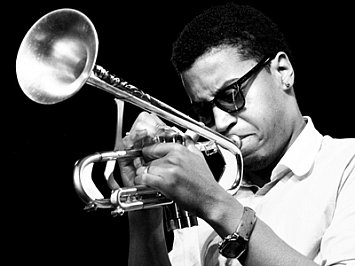
Trumpeter Christian Scott out of New Orleans is a hot property in jazz these days. He has received considerable critical acclaim for his unique tone (he plays a specially made trumpet) and the intensity of his playing.
He learned from grandfather Big Chief Donald Harrison Snr and uncle Donald Harrison Jnr who had played in Art Blakey's Jazz Messengers, won a scholarship to Berklee, was signed to the Concord label, has appeared in fashion magazines for his distinctive sartorial style, and his most recent album Yesterday You Said Tomorrow – his third – opens with KKPD, moves through a version of Eraser written by Thom Yorke (of Radiohead) and includes pieces with titles such as Angola LA and the 13th Amendment (about the prison), The Last Broken Heart (about gay marriage) and The Roe Effect (about the result of legalised abortion).
The album was recorded by Rudy Van Gelder (of Blue Note fame) and has cover art insppired by Bob Dylan's Blonde on Blonde. Scott sees it in the lineage of those Sixties album – rock and jazz – which were uniquely connected to the social and political concerns of their period.
It is a very different jazz album – and the amusing, intellectual and articulate Scott is a very different jazz musician.
Elsewhere caught up with him in . . .
I'm in New Orleans at the moment, I
have a jazz camp that I do every year here called The New Jazz
School, so I am here teaching. It is kids from 5 to their early 20s.
I guess given your background – and the city you come from – you would be quite committed to working with young people. You had a lot of help when you were growing up from your grandfather and uncle.
Oh yeah.
I know you went to Berklee but given that background and the musical experiences all around you that you were having, that you would have been learning more from working live than going to Berklee. So what did you get from Berklee that you don't think you would have got otherwise.
One of the main things was the opportunity to find a camaraderie and have long-lasting relationships with my peers. When I was on the road it was with guys much older than myself, so at Berklee you could learn what your generation does which is musically different from your predecessors – and you get to cultivate relationships with people in your own age range.
I was also really into being in a classroom where there were people from different parts of the globe.
I was fascinated to turn around and meet a guy from New Zealand or Senegal or Osaka, and we could make a band together and share musical ideas from the different way we might play in our culture, and incorporate that into what we were learning.
When I was there I was taking philosophy classes and learning more about existentialism than I was about bebop. For me I had fun meeting people from all different walks of life, and seeing that people from all over are the same – and that's the message I am trying to impart to these children.
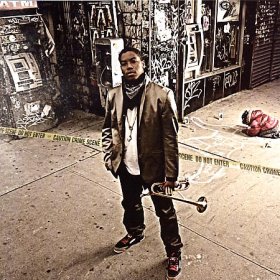
If we look back – and I know that it is wrong to categorise by generation – but there might be a sense that people come through say a Miles Davis Generation or a Wynton Marsalis Generation . . . When you look at your generation playing jazz, what sets it apart?
This is the fierst generation that hasn't had the opportunity to work with the guys who were really the masters. My experience was a little different because I learned from my uncle and Javon Jackson who played with the masters. So I got in a postion to get in their bands to learn from them. I had that opportunity to play with McCoy Tyner.
But my generation doesn't have a willingness to put themselves in a situation where they have to be second to anybody, they like to be kings of their domain. But I learned that in order to be a king you have to be a prince first.
So here's a generation that has an opportunity to learn this music in an academic way and carve their own path in a particular way and use their own ideology about music, because they never placed themselves in a position where they had to be second to anyone and learn in that way.
That's not a musical thing or about a musical language, but because they didn't have the chance to learn from the masters they have unique and personal styles. Whether or not those styles are grounded in the tradition and whether or not they use that as a launch pad is still waiting to be seen.
I'm very interested in your new album in that regard: You reference Bob Dylan in the cover art and I've seen that clip of you in a record store (below), and you speak about this ethos in the Sixties in which there were social and cultural things happening which was reflecting it and even driving it in some instances. Do you think that a lot of jazz has become uncoupled from what is going on in society in the past couple of decades?
Yeah. For some reason it seems to be in vogue to write music which doesn't have anything to do with your experiences. I don't understand why that is, but it seems most of the musicians in my generation are more concerned with their musical survival than they are with making music which speaks from their experience to help people.
I was always taught by the old guys in
New Orleans that you make music to help people navigate their own
experiences and use it as a means to help you with the things you are
going through.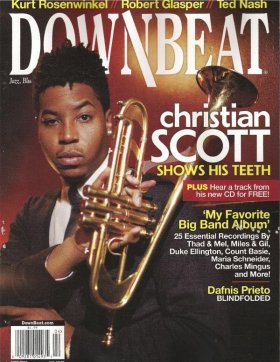
I'm never going to say that another artist or human being should do something, because that is their own choice. But I prefer to play in that vein because I think it is important, especially for someone who comes from the situation that I do in New Orleans. There are a lot of issues that need to be illuminated for people as a means for change. There may be someone who comes from a situation where things are not that bad so they may not have anything to say about their life. Whereas I am a little different.
I was talking to some people recently about what happened in rock culture, and there it was pretty clear that by about 1970 you could have rock music as just another viable career option. So these days it is like that for people and maybe not driven by anything other than that. In a sense you are suggesting in jazz with the growth of jazz in schools that jazz is just a thing you can do now and you don't have to be attached to any greater ethos.
That seems to be what is prevailing now. But when I look at that, it is a little disheartening because I think about the power that musicians have to change people and to illuminate ideas. There are infinite possibilities.
But they way most people who call themselves jazz musicians these days look at it is very narrow and limited. They just maybe look at something and say they are going to learn many permutations of rhythms or something and make this music that sounds like something new from what exists in the canon.
For me it is more important to come up with something which is different and make it personal, but also make it obvious to anyone who listens to my records that this is obviously a link in this chain of the great trumpet players. You can hear Miles Davis in my playing just as much as Louis Armstrong and that is important to me. I don't think anyone listening would say I sound like Miles Davis or Louis Armstrong – but you can hear their inspiration.
So it seems most jazz that people are into at the moment doesn't have much to do with that stuff. It either way too much to do with it, or nothing at all.
What we are trying to do is create a middle ground because art has to keep moving, we don't want art to be stagnant.
What I heard in your music which I don't hear in too much contemporary jazz is a sense of gravitas, an emotional weight. You've constructed this album with clear running order with KKPD which a dark and challenging piece but then you allow a bit of breathing space with Thom Yorke's Eraser. I don't mean this in an pejorative sense, but it is a clever album.
(Laughs) Thank you and you know, this is so funny. I give myself vocabulary work and every week I have 25 words to learn or those that I have heard and think I already but know the meaning of but maybe don't. But I just looked up 'pejorative' and I appreciate you using it, I've been trying to find different ways of using all week!
I'm old enough to have seen the way some critics or writers won't move with the times and I've seen with you some comment on the way you dress which I find amusing. Have you encountered any kind of old school/new school schism?
Sure. The funny thing in my experience with writers and critics is either they love me or they can't stand me. But if I have an opinion on something I am going to speak out and say it and contextualise it and try and offer something that is productive about it – even if it is something that could be construed as negative.
I think lots of times most of the
writers I have met in the past 10 or 15 years would prefer their jazz
musicians like the masters who were more emasculated. They would
prefer a musician who lets things slide. I like to get clarity and
will often stop people and ask, and I'm not trying to be an asshole.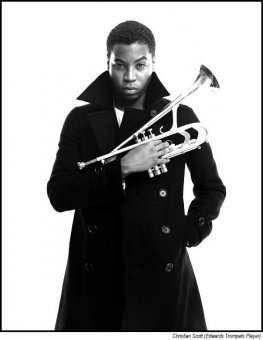
Often people will ask me who my influences are and I correct them because I don't use the word influences when I talk about my music. Because in the culture I was raised in, when people use the word 'influence' it usually has a negative connotation – which is not a negative thing to tell someone, it is just clarifying the reason why I would not use that word.
But I could not tell you how many times I've ended up getting in arguments with writers who say, 'that is absolutely ridiculous and I don't appreciate that you are trying to correct me'. I'm not trying to correct anyone, I am just saying I don't view people as influences, they are people who inspire me.
So even small situations like that you'd be surprised what ends up as the by-product. I've had people say my demeanor is demonstrative because I have the brass to say how I feel.
You have to take all these situations with a grain of salt. I try not to take myself too seriously but if there is something that needs to be changed I am going to say something about it. I think that makes people keep their distance or say negative things because they would prefer I shut up.
I probably won't. (Laughs)
I encountered this when I've interviewed both Wynton and Branford a few times and they are very funny guys with a smile. But when you put it in print it can look arrogant or demeaning or whatever. I've often had to be very careful in how I write that up.
I've had the experiences where the writers just put it down straight! (Laughs) It's hard for people to contextualise things, like the inflections in your voice can change the meanings of things.
So it's hard to navigate and I'm struggling with that. I try to work at my interviews because I want people to understand that everything I do as an artist is for the betterment of other people and the craft. I love this stuff and it's what I have spent my life doing, so I try and be as positive as possible. But sometimes I can be very real.
Your music, especially on this album, is grounded in sometimes political ideas and that demands some explanation for some people.
Sure. When I get asked questions about
some of those things I've learned that sometimes the journalist or
writer has their own aims in asking me the question. They bring their
own feelings before they've heard me speak about what it is I mean,
and I've had to learn how to navigate those things . . . and that can
be difficult. Like I use Ku Klux Police Department, that's gonna
spark something.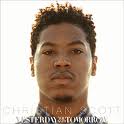
I've spent time in your wonderful country but I can imagine what a title like The Roe Effect could conjure up for some people. You were asking for trouble.
Yeah. (Laughs) To be honest this journey has been filled with roadblocks but I have to continue to keep moving and get better, and make music that speaks to people or illuminate these things as means for change.
Some people look at the titles and read the things I've said, and the conclusion they come to is that I'm saying very stern, negative things. Even with KKPD someone asked me if that was a hate song.
I don't make music from the stance of hate, I was taught to make music with love in your heart. But the reason I titled it that is because that is what they have made me feel. The situation was that these people tried to emasculate me and take my humanity away from me -- and it hurt.
Part of the reason I titled it like that was because in many parts of the United States for African-American men that police officers can pull them over for anything that they want. And that can be frustrating.
The one thing my grandfather and great grandmother would tell me was about the Klan. I may be in Montgomery, Alabama and to me it just seems like thy have a Ku Klux police department because of the way they treat you. So it isn't coming from hate but about something that is allowed to exist in certain places, and it shouldn't. I don't want my son to have to deal with that, but if I don't call it out then maybe he will.
Some people mistake comment for criticism. You are perfectly entitled to observe something and put that out out in the world.
Even when you talk about The Roe Effect, a lot of people think I am making a statement about being pro or against abortion. The funny thing was, it was just written to spark thought about the Roe Effect.
It was made for a movie but once it wasn't going to be used there I thought I could use it to create a situation where I could bring the thought up to people. What I feel about that situation is changing too, I don't know how I feel about abortion, I am still forming my opinion. But the piece was written to make us think about it, actually think about it and not simply regurgitate what we've heard other people say.
There's your problem, you don't have an opinion in these times when everyone is expected to have an instant opinion on just about everything. I think people are perfectly entitled say, 'I don't know, I'm still thinking about it'.
Sure. In my experience, nine times out of 10 when I have come to a conclusion and know how I feel about something, then something happens and I change my perspective. I'm only 27 and on any subject, whether it be theology or mundane things, I do change how I feel. I'm not cut from that cloth which says, 'This is how I feel and that's not going to change'. I like to feel I am evolving.
By coincidence I am reading There's A Riot Going On about about radicalism in the Sixties and in that it is very clear people were changing their political opinions every week. The Huey Newtons were very clear, but the people around them would move from one group to another, a rolling maul of ideas and ideologies.
Yeah, that is amazing and cool to me, whether it gets anything done is to be determined. But people should have the capacity to change and most of the things I've learned have revolved around choices. But you should make a choice once you are informed.
You work in an idiom which is impossible to define and we use the word jazz carelessly these to cover all kinds of music. But you are lucky in that it allows you to explore these ideas through music. And you have an excellent band on the album, [guitarist] Matthew Stevens brings an often disconcerting undercurrent to the music.
The band on the album is 'the band'. I wanted to have that because I some people have a touring band and a recording band and my generation doesn't seem to be interested I refining their own style. They want to define what they want, then build a super-band around them. What I wanted was to define a group in which we could refine different ideas and we could go through trial and error periods.
We rehearse conceptions more than music because the band is a reservoir of ideas. We're like scientists in the lab trying to solve musical problems. That is why we clearly have a sound.
I learned from McCoy that creating a band is very daunting and you have to work at it and most musicians in this period don't take pride in working on themselves as a collective. And my trumpet is very hard to play.
It is designed to take all the pressure away and most trumpeters use the pressure to play in the higher register. So this one can be very difficult, but I designed it so . . . (Laughs)



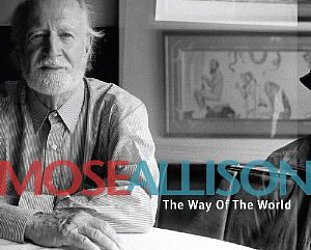
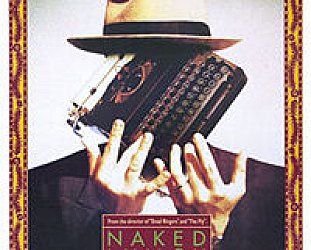
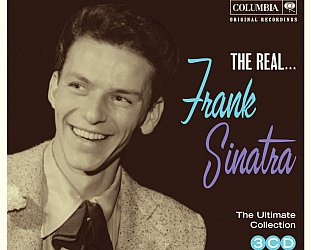

post a comment